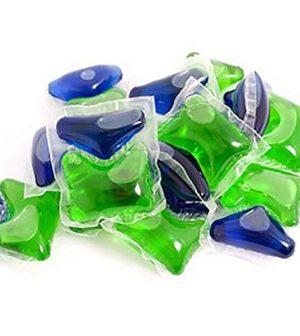- Could Your Grocery Store Meat Be Causing Recurring UTIs?
- Are You Making This Expensive Thermostat Error This Winter?
- Recognizing the Signs of Hypothyroidism
- 10 Strategies to Overcome Insomnia
- Could Artificial Sweeteners Be Aging the Brain Faster?
- Techniques for Soothing Your Nervous System
- Does the Water in Your House Smell Funny? Here’s Why
- Can a Daily Dose of Apple Cider Vinegar Actually Aid Weight Loss?
- 6 Health Beverages That Can Actually Spike Your Blood Sugar
- Treatment Options for Social Anxiety Disorder
Detergent Pod Poisoning Threat to Kids Hasn’t Gone Away

The health dangers posed by colorful detergent pods continues to plague young children, a new study warns.
U.S. poison control centers still receive one call every 44 minutes about a young child who’s been harmed through exposure to a liquid laundry detergent pod, researchers report.
The steady stream of calls is evidence that voluntary standards adopted by detergent manufacturers in 2015 and 2022 have not gone far enough to protect children, the researchers noted.
“The voluntary standard, public awareness campaigns, and product and packaging changes to date have improved the safety of these products, but a high number of children are still exposed each year,” said senior researcher Dr. Christopher Gaw, an, emergency medicine physician with the Center for Injury Research and Policy at Nationwide Children’s Hospital in Columbus, Ohio.
Liquid laundry pods are designed to dissolve in water, and so are apt to release their toxic contents when they come in contact with a child’s wet hands or mouth.
Researchers noted that liquid pods have proven more toxic than traditional liquid and powder detergents, although the reason why isn’t yet fully understood.
U.S. poison centers received 36,279 calls regarding liquid detergent pods during three recent years, according to data from the National Poison Data System.
Most of the calls involved a child younger than 6 (87%), and nearly all happened in the home (99%).
Luckily, only 6% resulted in a serious threat to health, and only nine deaths were associated with the ingestion of detergent pods. All nine deaths involved adults, seven of whom were older than 70.
The findings were published recently in the journal Clinical Toxicology.
Detergent makers first issued a voluntary safety standard in 2015 and recently updated that standard in March 2022, researchers noted.
But the voluntary standard allows manufacturers great flexibility, providing them six different ways to meet the requirement for child-resistant containers, researchers said.
The standard does not require manufacturers to conform to the Poison Prevention Packaging Act (PPPA) of 1970, which has proven highly effective in preventing child access to poisons, the researchers noted.
“Requiring that all liquid laundry detergent packet packaging be PPPA-compliant would be an important next step in reducing child access to these products,” co-author Dr. Gary Smith, director of the Center for Injury Research and Policy at Nationwide Children’s, said in a hospital news release.
“In addition, each laundry packet should be individually wrapped with child-resistant packaging, which would provide important layers of protection for this highly toxic product,” Smith said.
Manufacturers also should investigate reformulating the detergents inside the pods, to make them less toxic, researchers argued.
In the meantime, experts recommend that people use traditional laundry detergents instead of pods if they care for children younger than 6 or adults with dementia, Alzheimer’s or a developmental disability.
“Many families don’t realize how toxic these highly concentrated laundry detergent packets can be,” Gaw said. “If you have young children or vulnerable adults in your home, using traditional laundry detergents is a safer alternative.”
More information
Texas Children’s Hospital has more about laundry detergent pods.
SOURCE: Nationwide Children’s Hospital, news release, Jan. 22, 2024
Source: HealthDay
Copyright © 2026 HealthDay. All rights reserved.










